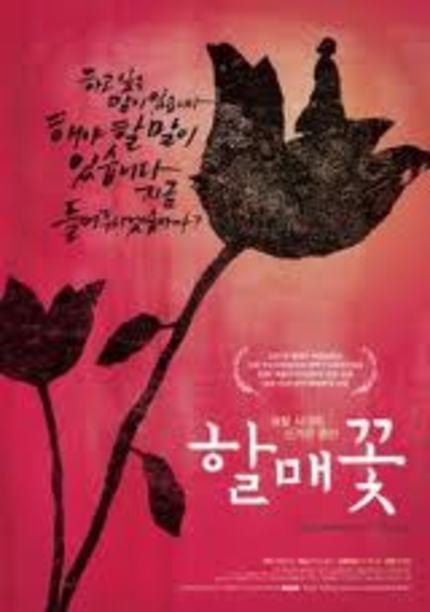Subway Cinema Free Korean Movies Series: GRANDMOTHER'S FLOWER Review

GRANDMOTHER'S FLOWER will be showing free on October 12, 7PM, at the Tribeca Cinemas for you NYC residents. You can find more details at the Subway Cinema site.
Subway Cinema director and NYAFF programmer, Grady Hendrix has been eager for me to get a review up of this, at times, wrenching documentary. There were all kinds of reasons why I put off typing this out over the last few weeks (I actually watched the doc about three weeks ago), but if I'm going to be honest about why I had trouble putting words to page, it's because Grandmother's Flower has the distinction of being an utterly brilliant piece of documentary filmmaking crafted by a technically unsophisticated and in some ways repellent filmmaker.
The filmmaker in question is director Jeong-Hyun Mun, whose family--particularly his ailing grandmother--provide the impetus for the making of the documentary. With the family matriarch hospitalized and facing less and less time on Earth, Mun is encouraged by his mother to document his grandmother's struggles during and after the conflict that divided Korea into the North and South. Mun's hometown is situated alongside two others: another, prosperous, neighboring village, and a smaller, traditionally poorer village in the valley. The three villages create a microcosm for the national conflict, with some of the middle class (including Mun's grandfather) embracing left-wing ideology, while the embittered, traditionally church-going, poorer villagers align themselves with the right, to the extent that it creates sometimes open, sometimes clandestine violence, which has affected Mun's family profoundly over the last 50 years.
What the director uncovers through his conversations with family members and people from the area, is a history of murder, madness, and torture, and how his grandmother tried to hold the family together through it all. In spite of facing poverty, abuse at the hands of an alcoholic, leftist husband, the murder of one brother, and the exile of another, this incredible woman was still able to raise a family and keep them fed in circumstances that would lead most of us to lose our minds.
Some of the subjects in the documentary, notably the director's immediate and extended family, are happy to talk on-camera about what they went through and how it affected Mun's grandmother. Still, others from the village--family friends and people with knowledge of the time--would rather not open up old wounds. This is actually a common refrain among some of the subjects: let the past stay the past. Interestingly, many of those least interested in talking are the members of the poorer, right-wing affiliated village. Apparently, families whose members had leftist leanings are followed by this detail in state-kept files: apparently the South Korean government isn't so quick to forget.
The documentary is shot on video using what would appear to be a fairly inexpensive camera. It gives the film the feeling of the kind of home movies one would put together for a wedding (or a funeral). Still, Mun is able to get the story, traveling between his hometown to Japan to meet extended family he's never known to learn more about a great uncle who fled Korea as a Communist sympathizer. It's Mun who's the most problematic element of the documentary, which coldly and dispassionately--he seems to be trying to approach the material as a journalist, but seeing some of the emotional reactions of the subjects his distance creates distance for the viewer. My earlier description of Mun as repellent is inaccurate: he's almost a non-entity in his own work.
Still, what a story. It feels particularly timely given the impending change in leadership in the DPRK along with their announcement that they'll begin allowing reunions between Northern and Southern families, a practice that goes in and out of favor with the Communist government based on the where they are diplomatically with the South. The power of this film is that it illuminates a conflict that is still going on within the borders of the South in a way that speaks volumes about the greater ongoing struggle between the divided Koreas.
You can read more from Charles at his blog, Monster In Your Veins.







